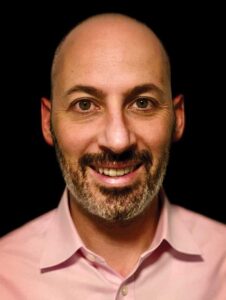 DEGREES: B.A. in political science; M.A. in public policy, Harvard Kennedy School
DEGREES: B.A. in political science; M.A. in public policy, Harvard Kennedy School
JOB TITLE: Executive director, East Harlem Tutorial Program; co-founder and executive director, East Harlem Scholars Academies
FAVORITE TRINITY MEMORY: My favorite Trinity memory happened soon after I graduated, when I married my wife, Erin Blakeley ’98, in the Trinity College Chapel in August 2001. My other favorite memory is that I had a chance to be a sixth-grade volunteer teacher in Hartford, which really sparked my passion for education and equity. The college also helped me launch Trinity Live, a large-scale concert series that I used to draw attention to hunger and homelessness.
What is the mission of the East Harlem Tutorial Program? It’s been around since 1958. It’s a community-based education nonprofit that runs schools and after-school programs. It will serve at least 25 percent of all the kids in East Harlem by 2025. Our goal is to dramatically raise the high school and college completion rate in East Harlem as well as to help our students become their best possible selves. We take a very holistic approach to education. We know that our students’ academic and emotional development are really critical and that achieving success means being armed with both information and the ability to build strong relationships. We strive to use what we call an anti-racist approach—a teaching, learning, and care model that aims to account for the central and historical impact of race and racism in the United States.
What do you enjoy most about your work? I’m in my 12th year as executive director, and part of what I continue to enjoy is that I just love working with students. Every day is really different, and I get to apply a number of varied ways of thinking. I have to be sort of a generalist. I’m not a super expert at any one thing, but I need to be pretty good at a bunch of things. I’ve often had to quickly develop expertise in new areas, whether it’s real estate, child development, finance, or human resources. I think a really high-quality liberal arts education is good for preparing a generalist.
What are the biggest challenges you face? Education takes both urgency and a long-term perspective. Every student and teacher learns differently, and everyone goes through ups and downs. At the same time, you only get one chance at adolescence, and I believe everyone deserves a great education. On top of all this, families in East Harlem continue to be systematically denied a fair amount of resources, and it’s really hard to find enough great teachers. My hope is that the best and brightest out of Trinity become educators.
How did Trinity prepare you for the work you do? Trinity emphasizes the fact that you need to build relationships and you also need to work across disciplines. For me, Trinity prepared me the most because I got involved with things going on outside of campus. I was pulled into a mentor program in Hartford that was really life changing for me; it made me realize that I wanted to be in education. I got very involved in the city of Hartford while there, and doing so helped me understand the difference between the amazing amount of resources Trinity had and the lack of resources that some of the students across Hartford had. That helped me think about how I could put my skills and relationships to work to help others gain the same opportunities.
Was there a professor who was particularly influential? Who was it, and why? I met the most influential educator in my life, Professor Jerry Watts, who passed away suddenly in 2015. He pushed me hard, but with endless love and support. He’d stop me on the Long Walk and ask, “Are you going to be a brick head, or are you going to be a true scholar?” He drove me to work harder and to take a deeper look at the history of institutions in the United States, to look at issues of race and racism, and to go outside my comfort zone. He was also hysterically funny, endlessly kind, and a great writer.
